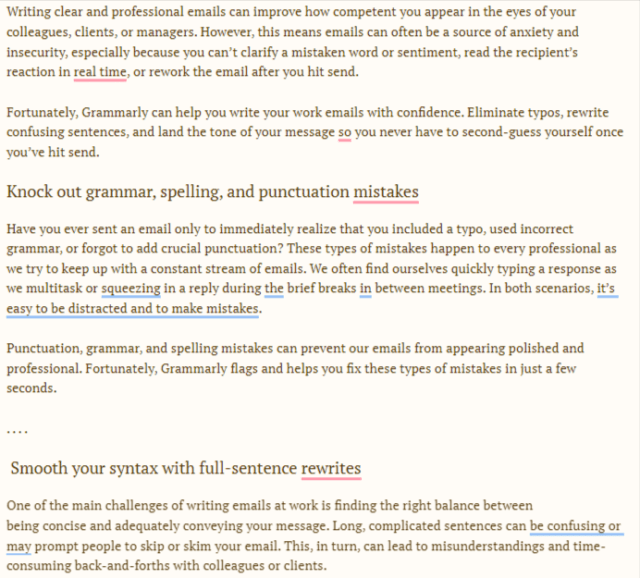From The Grammarly Blog:
Writing clear and professional emails can improve how competent you appear in the eyes of your colleagues, clients, or managers. However, this means emails can often be a source of anxiety and insecurity, especially because you can’t clarify a mistaken word or sentiment, read the recipient’s reaction in real time, or rework the email after you hit send.
Fortunately, Grammarly can help you write your work emails with confidence. Eliminate typos, rewrite confusing sentences, and land the tone of your message so you never have to second-guess yourself once you’ve hit send.
Knock out grammar, spelling, and punctuation mistakes
Have you ever sent an email only to immediately realize that you included a typo, used incorrect grammar, or forgot to add crucial punctuation? These types of mistakes happen to every professional as we try to keep up with a constant stream of emails. We often find ourselves quickly typing a response as we multitask or squeezing in a reply during the brief breaks in between meetings. In both scenarios, being distracted and making mistakes is easy.
Punctuation, grammar, and spelling mistakes can prevent our emails from appearing polished and professional. Fortunately, Grammarly flags and helps you fix these types of mistakes in just a few seconds.
. . . .
Smooth your syntax with full-sentence rewrites
One of the main challenges of writing emails at work is finding the right balance between being concise and adequately conveying your message. Long, complicated sentences can be confusing or may prompt people to skip or skim your email. This, in turn, can lead to misunderstandings and time-consuming back-and-forths with colleagues or clients.
Of course, writing clearly isn’t as simple as it sounds. While something might make sense in our head, it doesn’t always come across the same way when we write it down. And it’s even more challenging to convey our ideas in words when we’re writing in a hurry. So we often end up with overly wordy or run-on sentences in our emails, but we don’t have the time or patience to rework them.
With Grammarly Premium, you can feel confident that your message is clear. Grammarly Premium not only identifies sentences that may be too wordy or confusing but also helps you streamline your editing process by offering full-sentence rewrites that help make your point easy to understand.
. . . .
Strike the right tone
You may have found yourself rereading an important email to ensure your tone is coming across how you intended it to. The tone of your writing influences how people perceive your message and can impact your relationship with colleagues and clients. However, tone is difficult in written communication because you can’t use your voice or facial expressions to signal how you intend to come across. Without this context, your recipient may misinterpret your tone.
Grammarly Premium’s tone rewrite suggestions can identify sentences where your tone may be misunderstood and offer rewrites to help you sound more personable, confident, or positive.
Link to the rest at The Grammarly Blog
PG has been a big fan of Grammarly for a long time. One of the ways he helps Mrs. PG with her books is to run the final draft through Grammarly.
However, he enabled Grammarly for Chrome for TPV to check on his posts, then disabled it because it was a bit too nitpicky and slowed him down too much.
He’s just turned Grammarly back for TPV on for another trial.
One interesting discovery he made after he revived Grammarly is that the program had several suggestions for the portion of the Grammarly blog post PG excerpted for this post.
Here’s a partial screen shot of Grammarly’s suggestions on PG’s computer for improving Grammarly’s own blog post:

Taking the Grammarly suggestions from top to bottom:
- real time should be real-time
- message so should be message, so
- mistakes should have a period after it
- “We often find ourselves quickly typing a response as we multitask or squeezing in a reply during the brief breaks in between meetings.” should be rewritten as “We often find ourselves quickly typing a response as we multitask or squeeze in a reply during brief breaks between meetings.”
- “In both scenarios, it’s easy to be distracted and to make mistakes.” should be rewritten to read, ” In both scenarios, being distracted and making mistakes is easy.”
- “Smooth your syntax with full-sentence rewrites” should have a period at the end.
- “sentences can be confusing or may prompt people to skip” should be rewritten as “can confuse or may prompt people to skip”.
PG suggests that this demonstrates that, while quite helpful in many cases, sometimes Grammarly puts a foot wrong. That said, PG will continue to be a regular user of Grammarly.
I haven’t considered using Grammarly since I heard them describe a run-on sentence as a “really long sentence” in a commercial. If they don’t know something as basic as what a run-on sentence is (It can be as short as four words), what else might they get wrong? Besides, there is no option better than the human mind.
Chuckle.